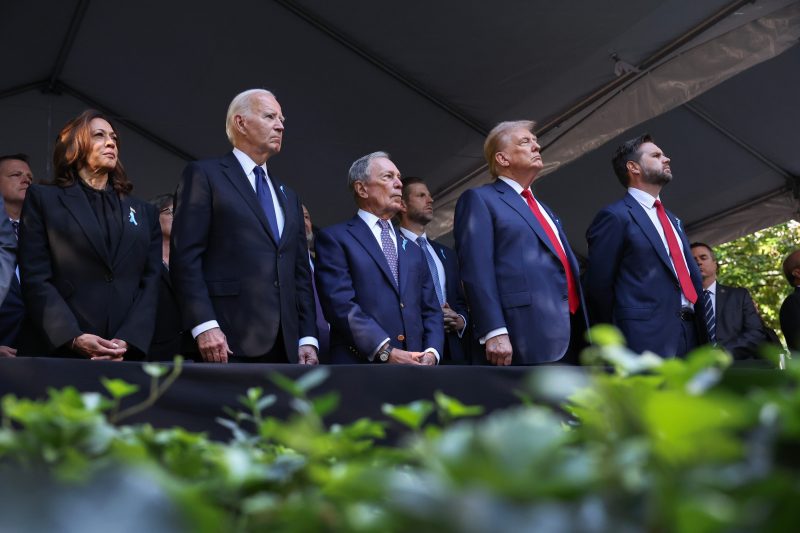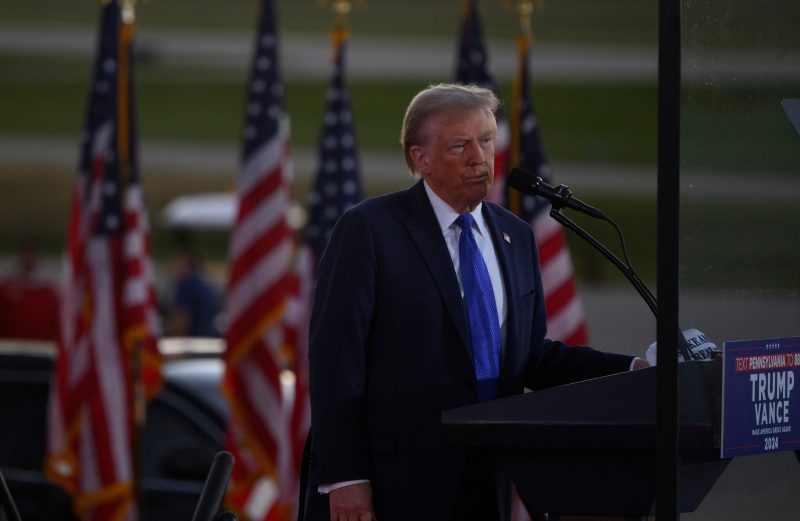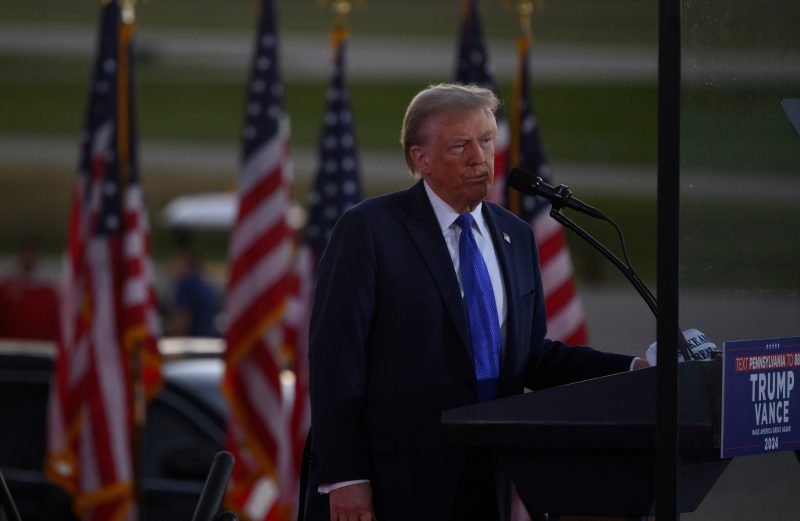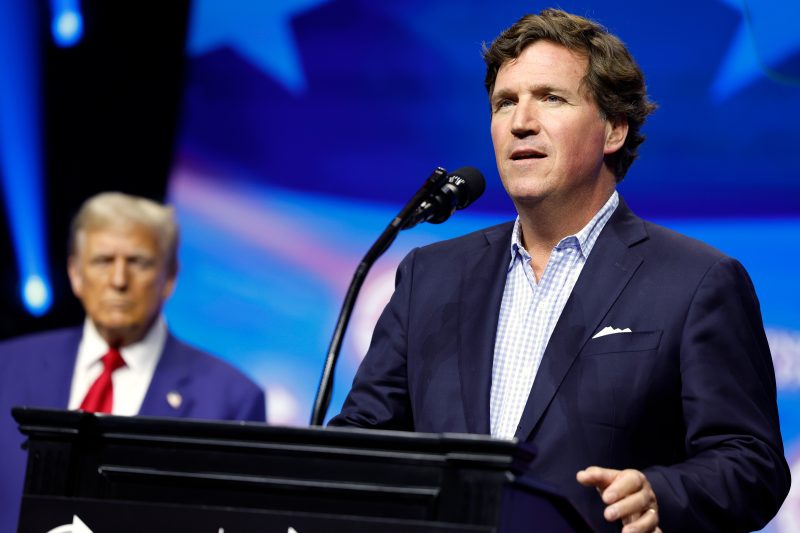
Harris, Trump set politics aside at ceremony to commemorate 9/11 attacks
NEW YORK — Vice President Kamala Harris and her Republican rival Donald Trump on Wednesday morning both arrived here in Lower Manhattan, the site of the worst terrorist attack in American history, each pausing for a moment of solemn commemoration in the midst of a frenetic political season.
They stood feet away from one another, joined by President Joe Biden and GOP vice-presidential nominee JD Vance, and listened as bagpipes wailed, as moments of silence were held and names of victims were read by family members.
It was an abrupt shift in tone after an aggressive debate Tuesday night, one that Trump has complained about and one that filled the Harris team with jubilation. Harris and Trump briefly greeted one another — and Biden and Trump did as well — before taking their respective spots.
Harris and Biden are traveling together later Wednesday to Shanksville, Pa., the rural area where United Airlines Flight 93 crashed into a field 23 years ago, and to Arlington, Va., where American Airlines Flight 77 crashed into the Pentagon.
Harris’s team made it clear that Wednesday’s events would have no hint of politics as she honors those who lost their lives in the terrorist attacks. But Harris, Biden, Trump and Vance all standing together at the New York memorial was a striking tableau in a political cycle in which Harris has — in both direct and subtle ways — attempted to reclaim the mantle of patriotism that has been more associated with Trump and Republicans over the past decade.
A core message in her campaign is that she would put the interests of all Americans above her own, while she paints her opponent as a “self-serving” agent of chaos who would endanger the country’s military and national security. She crisply delivered that case in Tuesday night’s debate, and her campaign is intensely focused on drawing voters’ attention to Trump’s past remarks disparaging members of the military. They also hope voters will revisit Trump’s embrace of conspiracy theories, including his insistence that he won the 2020 election and his revisionist descriptions of his role in the Jan. 6, 2021, attack on the U.S. Capitol. Trump exhibited that same behavior more than 20 years ago when he made questionable claims about what he witnessed during the attacks on Sept. 11, 2001. (Trump said at the time, for example, that he watched as thousands of Muslims cheered in Jersey City, when the buildings came down, an assertion that has been debunked).
The candidates did not speak during the morning event, with the focus on listening to family members of the victims. Some were children, born after the attacks, while others recalled memories of an uncle, cousin, father or sibling. Trump was joined by his sons Eric and Donald Trump Jr., with Rudy Giuliani seated nearby, while Harris was near Sen. Charles E. Schumer (D-N.Y.) and Gov. Kathy Hochul (D-N.Y.)
“Today is a day of solemn remembrance as we mourn the souls we lost in a heinous terrorist attack on September 11, 2001,” Harris said in a statement ahead of arriving here. “As we commemorate this day,” she added, “we should all reflect on what binds us together as one: the greatest privilege on Earth, the pride and privilege of being an American.”
Trump began the morning with an interview with “Fox & Friends” in which he complained about the debate moderators, cited lopsided polls declaring him the winner, and said he was “less inclined” to agree to another debate, as Harris has proposed.
“It was three to one. It was a rigged deal, as I assumed it would be,” he said on Fox News. “But I thought I did a great job.”
Trump briefly touched on the Sept. 11 attacks during his Fox interview, calling it “very sad” as he noted he would visit the crash sites in New York and Pennsylvania. “It was a horrible day. Horrible day. There’s never been anything like it. Just a horrible day.”
During his nearly decade-long stint in the public arena, Trump has infused his appearances with patriotic themes — from the frequent chants of “USA! USA!” that he sparks at his rallies to the moment at the Conservative Political Action Conference in 2020 when he hugged and kissed an American flag onstage while mouthing “I love you, baby.”
Since Harris launched her presidential campaign in July, she has tried to reframe the patriotism debate — positioning herself as a leader who would fight to preserve America’s freedoms, including reproductive rights, while casting Trump as someone who would restrict them. Those themes are a continual thread at her rallies, particularly as she seeks to broaden her appeal to more conservative voters whom Trump has alienated with his tone and tactics.
The vice president reintroduced herself to the nation in her convention speech as the product of an American story — a middle-class daughter of immigrants who was able rise to the highest echelons of power because of the unique opportunities that her country offered. The Harris campaign has also tried to elevate past criticism of Trump from former military leaders and Trump’s former aides — including former vice president Mike Pence, former defense secretary Mark T. Esper and Gen. Mark A. Milley, former chairman of the Joint Chiefs of Staff. Harris forcefully made that case herself Tuesday night in the debate, telling Trump that former military leaders have described him to her as “a disgrace” and faulting the former president for failing to accept any responsibility violence that occurred on Jan. 6 at the Capitol.
“For everyone watching, who remembers what January 6th was, I say, we don’t have to go back.,” Harris said Tuesday night. “It’s time to turn the page. And if that was a bridge too far for you, well, there is a place in our campaign for you to stand for country, to stand for our democracy, to stand for rule of law and to end the chaos and to end the approach that is about attacking the foundations of our democracy because you don’t like the outcome.”
Over the past week, Harris’s campaign has deployed high-profile Republicans to argue that patriotic Americans should back the vice president, even if they don’t agree with her ideological positioning. GOP surrogates like former Pence adviser Olivia Troye and Anthony Scaramucci, who briefly served as Trump’s White House Communications director, drove that message in Philadelphia this week. Both highlighted the importance of the recent announcements by former vice president Dick Cheney and his daughter, former congresswoman Liz Cheney (R-Wyo.), that they will be voting for Harris.
“The Cheneys look at Vice President Harris’s economic agenda, her ideas around national security and they know that it’s in line with the arc of American history,” Scaramucci said Tuesday before the debate. “There’s nothing radical about it, and I think it gives space and comfort to normal Republicans — not Trumpist Republicans, but normal Republicans and independent moderates — that Vice President Harris is the right choice in this current election.”
Trump, by contrast, has sought to portray Harris as a failed and ineffective leader, faulting her for the deaths of U.S. citizens in the Afghanistan withdrawal.
“They didn’t fire anybody having to do with Afghanistan and the Taliban and the 13 people whose were just killed viciously and violently,” Trump said during the debate. “And I got to know the parents and the family.”
Trump recently visited Arlington National Cemetery at the request of some of those family members, with some of his campaign officials getting into an altercation with a cemetery staff member who was attempting to enforce guidelines the campaign had received not to take photos and videos near the graves of U.S. service members killed in recent years. His campaign later posted a video of the visit on his social media accounts.
But Brian Hughes, a Trump spokesman, scoffed at Harris’s embrace of patriotic themes, arguing that she’s “saying what she needs to say, because she thinks this is what the voters need to hear.”
“The idea that somebody who let one of the worst military incidents — the withdrawal from Afghanistan — happen on her watch, refuses to acknowledge the loss of the families that were left behind — and then wants to tell me about patriotism? Come on,” Hughes said in an interview.
If memorials of Sept. 11 in the past provided a rare moment of national unity — with Republican and Democratic leaders embracing on the Senate floor anda nation cheering along as President George W. Bush spoke from a bullhorn atop the rubble in New York— the current moment has been one of bitter partisanship.
Trump is a longtime New Yorker whose views on immigration appeared to harden with the attacks. On that morning in 2001, Trump was watching CNBC as it prepared to interview former General Electric CEO Jack Welch, when the network cut away to a scene of the first tower on fire. One of his first reactions when the planes hit was to call a television show to offer commentary.
He later visited Ground Zero, and he has cited the attacks to challenge immigration policies, religious tolerance and the need for global alliances.
Trump has claimed that he saw the plane strike the second tower, and that from his window he observed the tragedy of people jumping from the buildings — claims that fact-checkers have questioned.
Trump called into a New Jersey radio station that day and was asked what he would do if he were president.
“Well, I’d be taking a very, very tough line,” Trump said. “This just can’t be tolerated. And it’s got to be very, very stern.”
He also remarked that a building he owned had been the second-tallest in Manhattan but, now that the twin towers had fallen, would become the tallest. (That also was inaccurate; a different building held that title).
Harris has spoken of the Sept. 11 attacks as an enduring reminder that unity in America is possible, even at moments of intense partisanship. In remarks at the Flight 93 National Memorial in Shanksville on the 20th anniversary of 9/11, Harris said America was reminded in the days following attacks that “unity is imperative in America.”
“It is essential to our shared prosperity, to our national security, and to our standing in the world. And by unity, I don’t mean uniformity,” Harris said at the 2021 event that also featured former president George W. Bush and his wife, Laura Bush. “We had differences of opinion in 2001 as we do in 2021. And I believe that in America, our diversity is our strength.”
Trump hasn’t often spoke with passion about 9/11, but he did invoke it during a 2016 Republican primary debate when Sen. Ted Cruz (R-Tex.) criticized him for “New York values.”
“When the World Trade Center came down, I saw something that no place on Earth could have handled more beautifully, more humanely, than New York,” Trump said. “You had two 110-story buildings come crashing down. I saw them come down. And we saw more death, and even the smell of death, nobody understood it. And it was with us for months, the smell, the air. And we rebuilt downtown Manhattan.”



